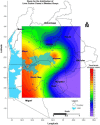Risk factors for liver Cancer in HIV endemic areas of Western Kenya
- PMID: 30607173
- PMCID: PMC6303973
- DOI: 10.1186/s13027-018-0214-5
Risk factors for liver Cancer in HIV endemic areas of Western Kenya
Abstract
Background: Hepatocellular carcinoma (HCC) is a malignant cancer of the liver and a leading cause of cancer-related mortality worldwide. Human immunodeficiency virus (HIV) has not been known to have a direct causal relationship with HCC despite independently causing inflammation of the liver. However, little is known on risk factors for HCC patients in an HIV endemic area. The objective of this study was to ascertain the risk factors of HCC and its association with HIV infection.
Methods: This was an un-matched case-control study conducted between June 2015 and June 2016 in Kisumu County Referral Hospital, Kenya. The study enrolled 257 patients with HCC cases and 257 controls. A multivariable logistic regression analysis was used to assess the risk factors for HIV and controlling for exploratory variables. Independent t-test was used to compare means. Exposure variable with values < 0.05 were considered to be statistically significant.
Results: HCC cases were more likely to be above 35 years old compared to controls (88.3% vs 23.0%), [aOR =51.6, 95% CI (27.8-95.6), P < 0.001)]. HBV infected patients have higher risk of HCC (47.1% vs 30.4%), [aOR = 3.3; 95% CI (1.7-5.0), P < 0.0001)]. HIV positive patients were more likely to have HCC than HIV negative patients (33.5% vs 10.9%), [aOR =4.3, 95% CI (2.2-8.4)), P < 0.001]. Females have lower risk of HCC than males (32.7 vs 23.7) [aOR = 0.2, 95% CI (0.1-0.4), P < 0.001]. The majority of HCC patients were at the time of diagnosis at stages C (35.1%) and D (48.6%) according to the Barcelona Clinic Liver Clinic (BCLC) criteria.
Conclusion: Liver cancer was more frequent among adults and subjects co-infected with HBV and HIV. Thus, HIV represents an additional risk factor for liver cancer in this Kenyan population. Regular health screening of HIV and HBV infected subjects may significantly improve the early diagnosis and effective therapy of liver cancer.
Keywords: HCC; HIV; Multiple regressions; Risk factors; Western Kenya.
Conflict of interest statement
The Institutional Review Board of Jaramogi Oginga Odinga Teaching and Referral Hospital, Kisumu, Kenya approved the study.The first author, PhD. candidate, is a recipient of research funds from National Council of Science, Technology and Innovation (NACOSTI) and has no conflict of interest.Springer Nature remains neutral with regard to jurisdictional claims in published maps and institutional affiliations.
Figures
Similar articles
-
Prevalence of Hepatocellular Carcinoma in HIV Patients Co-infected or Triple Infected With Hepatitis B and Hepatitis C in a Community Hospital in South Bronx.Cureus. 2022 Jun 19;14(6):e26089. doi: 10.7759/cureus.26089. eCollection 2022 Jun. Cureus. 2022. PMID: 35875299 Free PMC article.
-
Etiology of hepatocellular carcinoma in West Africa, a case-control study.Int J Cancer. 2018 Aug 15;143(4):869-877. doi: 10.1002/ijc.31393. Epub 2018 Apr 10. Int J Cancer. 2018. PMID: 29569722 Free PMC article.
-
A simple CD4+ T cells to FIB-4 ratio for evaluating prognosis of BCLC-B hepatocellular carcinoma: a retrospective cohort study.BMC Cancer. 2022 Mar 23;22(1):311. doi: 10.1186/s12885-022-09433-3. BMC Cancer. 2022. PMID: 35321670 Free PMC article.
-
Coinfection of Schistosoma Species with Hepatitis B or Hepatitis C Viruses.Adv Parasitol. 2016;91:111-231. doi: 10.1016/bs.apar.2015.12.003. Epub 2016 Feb 5. Adv Parasitol. 2016. PMID: 27015949 Review.
-
Risk of hepatocellular carcinoma in hepatitis B and D virus co-infected patients: A systematic review and meta-analysis of longitudinal studies.J Viral Hepat. 2021 Oct;28(10):1431-1442. doi: 10.1111/jvh.13577. Epub 2021 Jul 28. J Viral Hepat. 2021. PMID: 34291520
Cited by
-
Hepatitis B virus infection and hepatocellular carcinoma in sub-Saharan Africa: Implications for elimination of viral hepatitis by 2030?World J Gastroenterol. 2021 Sep 28;27(36):6025-6038. doi: 10.3748/wjg.v27.i36.6025. World J Gastroenterol. 2021. PMID: 34629817 Free PMC article. Review.
-
The impact of HIV infection on clinical presentation and mortality among persons with hepatocellular carcinoma in Kampala, Uganda.BMC Infect Dis. 2023 Apr 6;23(1):216. doi: 10.1186/s12879-023-08164-5. BMC Infect Dis. 2023. PMID: 37024807 Free PMC article.
-
Reduced expression of microRNA-139-5p in hepatocellular carcinoma results in a poor outcome: An exploration the roles of microRNA-139-5p in tumorigenesis, advancement and prognosis at the molecular biological level using an integrated meta-analysis and bioinformatic investigation.Oncol Lett. 2019 Dec;18(6):6704-6724. doi: 10.3892/ol.2019.11031. Epub 2019 Nov 1. Oncol Lett. 2019. PMID: 31807180 Free PMC article.
-
Systemic Diseases and Gastrointestinal Cancer Risk.J Cancer Allied Spec. 2023 Aug 13;9(2):473. doi: 10.37029/jcas.v9i2.473. eCollection 2023. J Cancer Allied Spec. 2023. PMID: 37575213 Free PMC article. Review.
-
The role of infections in the causation of cancer in Kenya.Cancer Causes Control. 2022 Dec;33(12):1391-1400. doi: 10.1007/s10552-022-01625-3. Epub 2022 Sep 10. Cancer Causes Control. 2022. PMID: 36087193 Review.
References
-
- Hoffmann C. Abnormal liver function tests in HIV positive patients. AIDS. 1301:21.
LinkOut - more resources
Full Text Sources



